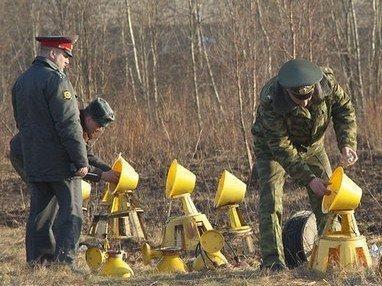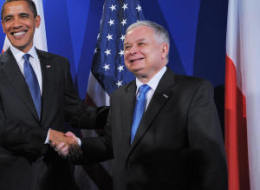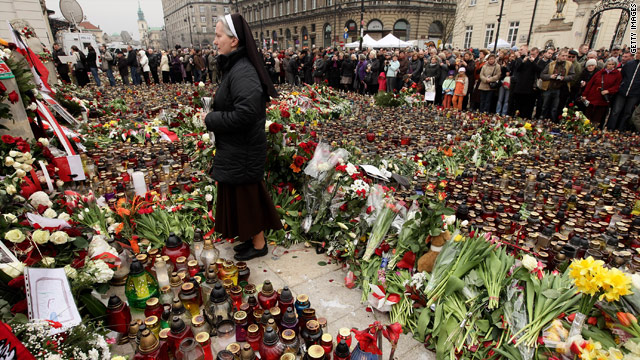WASHINGTON (March 31) -- Do Democrats need a new "silent majority" to speak up and save them from electoral ruin in November? Does such a group even exist? And, if it does, will the tea party movement prove to be the right-wing mirror of the leftist anti-war movement of the 1960s?
These are not idle questions for President Barack Obama, who has
seen little bounce from his party's victory in passing health care reform legislation.
"The good news for Democrats, after health care passed, was that Democratic intensity levels went up," party strategist James Carville told reporters Wednesday. The bad news, he said, was that they don't nearly approach the enthusiasm levels among Republicans riled up and angry over what they see as deficit-ridden big government. If that continues until November, he said, "that doesn't bode well for Democrats" and their current edge in Congress.

Robyn Beck, AFP / Getty Images
Tea party activists protest in Searchlight, Nev., the hometown of Senate Majority Leader Harry Reid, last weekend.
Tea party protests have dominated cable TV since last summer's raucous town hall meetings on health care. Hundreds stood outside the Capitol last week to protest the legislation in the final hours before its passage.
Only a
few dozen counterprotesters showed up to challenge them. Ryan Rutledge, 20, a member of College Democrats at the University of Wisconsin at Stevens Point, was among them. As he and other students chanted, "We've got the votes," they were drowned out by tea partyers singing, "Nah nah nah nah, hey hey hey, goodbye."
"People need to be more active" in support of Obama's policies, Rutledge said. Why weren't more supporters out carrying "For Health Care Reform" signs? "Most Democrats have jobs. These people are mostly retired and already have health insurance," he said, motioning to the crowd that also included
unemployed demonstrators.
Tea party activists have called their gatherings
conservative versions of
Woodstock, but that analogy cuts two ways. While a recent
Rasmussen poll revealed 53 percent approval for tea party positions,
another by Bloomberg showed that just 26 percent identified themselves with those views -- however outspoken about them they may be.
And that, say some analysts, makes the tea party like the 1960s
anti-war movement.
Both were "very intense, very vocal, very loud," Charles Franklin, a political polling expert at the University of Wisconsin-Madison, told AOL News. "You could plausibly make the parallel claim that it's the right that is in the minority [now] but is visible and loud and frankly driving the conversation, the coverage, in the same way that the anti-war protesters did."
President Richard Nixon countered the left-leaning protesters by coining the term "silent majority" to describe those Americans who supported his policy in Vietnam in a
November 1969 speech. Nixon said he would not be dictated by a "minority" of anti-war protesters "mounting demonstrations in the street."
The Republican president would later win a landslide victory over George McGovern in 1972, discrediting the Democrat's anti-war platform by winning 49 of 50 states for re-election.
"Nixon was right -- there was a silent majority and ultimately those voices were heard," Darrell West, vice president of governance studies at the Brookings Institution, told AOL News. "The lesson to be learned is that the noisiest people aren't always the most numerous. They attract a lot of media attention, but they may not be representative of the public at large."
At a time when President Obama's job approval rating is
split evenly among supporters and detractors, Democrats may take solace in the lessons of history. True, recent elections in
Massachusetts and earlier in
Virginia and New Jersey were big blows. But if there is a left-leaning "silent majority" waiting in the wings, the events of the next few months could help them find their voice.
"As the right becomes radicalized, they risk alienating the center," Democratic strategist Paul Begala told AOL News. "The fringe anti-war extremists in the '60s discredited the left and legitimate liberalization for a generation."
Whether
extremists on the right will do the same to the tea party remains to be seen. More relevant for congressional elections this fall, Begala said, "Is there an Obama movement or was there just an Obama moment?"
Democrats like Carville acknowledge that the thrill of those "
Yes We Can" days is gone. Analysts say that's to be expected.
"When you've won, you then sit back and wait for your guys to govern," said Cal Jillson, a Southern Methodist University political scientist.
"It's easier to generate intensity in opposition than in support," West said. "Democratic activists have been complacent. ... They should realize that if they don't express their views, their voices won't be heard" in November.
Franklin agreed: "A silent majority that stays home and sits on its hands can help convert a loud minority into a winning voting coalition."
University of Virginia political scientist Larry Sabato said he isn't sure there is a left-leaning silent majority, but he is convinced that most of the 53 percent of voters who chose Obama in 2008 are still with him politically. He also said that the "vast majority" of opposition to Democratic policies comes from the minority 46 percent who voted for Republican John McCain.
"I don't think Obama's coalition is silent at all," he said, noting that many on the left grumbled loudly that he caved to moderates by dropping a public health insurance option and on Wednesday were
none too pleased over his expansion of offshore oil drilling. "They were as loud and assertive in '08 as the tea party crowd is today. By 2012, they'll be back in the public forum."
Republican message guru Frank Luntz isn't so sure. "There was a vocal majority that had had enough of [George W.] Bush and [Dick] Cheney and Republicans," he told AOL News. "But now they see this change and they don't like what they see. This is not change they can believe in. It's too radical for them, too government-centered."
Luntz said there are many who want Obama to do well, though. "There is a silent majority that still hopes he succeeds. They connect America's success with his," he said. "They just wish he didn't support what he supports."
 Poor Barack Obama, he just can't make anybody happy with his reset policy toward Russia. His opponents on the right argue that he's selling the farm through weakness and undeserved concessions to an uncooperative, aggressive government. Other critics - like us - bemoan the ill-considered bargain of Washington's Iran obsession in exchange for the free pass given to the siloviki on values of human rights, rule of law, corruption, and democracy.
Poor Barack Obama, he just can't make anybody happy with his reset policy toward Russia. His opponents on the right argue that he's selling the farm through weakness and undeserved concessions to an uncooperative, aggressive government. Other critics - like us - bemoan the ill-considered bargain of Washington's Iran obsession in exchange for the free pass given to the siloviki on values of human rights, rule of law, corruption, and democracy. Poor Barack Obama, he just can't make anybody happy with his reset policy toward Russia. His opponents on the right argue that he's selling the farm through weakness and undeserved concessions to an uncooperative, aggressive government. Other critics - like us - bemoan the ill-considered bargain of Washington's Iran obsession in exchange for the free pass given to the siloviki on values of human rights, rule of law, corruption, and democracy.
Poor Barack Obama, he just can't make anybody happy with his reset policy toward Russia. His opponents on the right argue that he's selling the farm through weakness and undeserved concessions to an uncooperative, aggressive government. Other critics - like us - bemoan the ill-considered bargain of Washington's Iran obsession in exchange for the free pass given to the siloviki on values of human rights, rule of law, corruption, and democracy.







 It looks increasingly likely that the British general elections will go right down to the wire. While the opposition Conservative party led the incumbent Labour party by as many as
It looks increasingly likely that the British general elections will go right down to the wire. While the opposition Conservative party led the incumbent Labour party by as many as